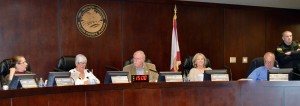By DOTTY NIST

DeFuniak Springs, Fla. – Following up on their March 16 workshop on the topic, county commissioners continued to discuss public use of the beach and take public comment on the issue, concluding with direction to staff to bring back a contract for investigation and analysis of the county’s options for protection and improvement of public use of the beach.
The discussion and direction took place at the March 22 Walton County Board of County Commissioners (BCC) regular meeting at the Walton County Courthouse.
On the meeting agenda was a proposal to authorize the Theriaque & Spain legal firm to be retained to represent the county, start an investigation on customary use of the beach, and bring a recommendation before the BCC at a later date.
Before the proposal was brought up, beachfront property owners in attendance began to urge against the county taking action in favor of public use of the beach in front of their homes.
Miramar Beach resident Don Riley stated that he had brought his property in 2003 with the intent to have a nice, quiet place to enjoy and that he had not contemplated “drunk youngsters” or other “trespassers” being present on his property.
“I don’t believe you have the authority to arbitrarily establish customary use,” Fort Panic beachfront property owner Ed Goodwin told the commissioners. He warned that what was being contemplated by the BCC was “a taking of property.”
Later in the meeting, the commissioners discussed the possibility of the county intervening as a co-plaintiff in a lawsuit seeking to prove customary use of the beach filed by some Gulf Place homeowners living in the subdivision interior. The lawsuit is Walton County Circuit Court. Walton County Attorney Mark Davis’ reasoning was that this could be a good case for the county to get involved in to gauge the difficulty of proving customary use in an area.
District 3 Commissioner Bill Imfeld, who had not attended the March 16 workshop, asked Davis if looking at proving public use of the dry sand would not involve a taking if the property in question was deeded to the mean high water line.
Davis responded, “The customary use doctrine is…essentially that the bundle of rights that you purchased when you purchased land that includes the white sand, the right to exclude the public from traversing and using the…white sand for traditional recreational purposes is not a right that you purchased; it is subject to the customary use of the public for those customary recreational and traverse uses.”
“It is our opinion that it is not a taking,” he said.
The commissioners did not move forward on participation in the lawsuit, with District 5 Commissioner Cindy Meadows commenting that she did not have enough information to make a decision.
Turning to the possibility of retaining Theriaque & Spain, Davis told the commissioners that to prepare for either a customary use ordinance or file a lawsuit to prove it, there would have to be significant expert investigation on the beaches, which would take months of time. There might be a finding that some beach areas had been customarily used by the public and other areas may not have been, he continued. Davis added that a suggestion from the March 16 workshop to evaluate the pros and cons of bringing customary use forward had been an excellent one.
There was an initial motion by District 2 Commissioner Cecilia Jones to retain the legal firm to take necessary legal action to protect the public’s right to use the dry sand of the beach. The motion was seconded by District 1 Commissioner Bill Chapman
Meadows responded, “I think we all agree that the public needs access to the beaches and that the private property owners have rights as well.”
She continued, “I’m going to appeal to everyone to consider our higher nature in this situation, because we’re all in this together…this is our economy…these are our investments, these are our homes…that we brought that we want to be proud of. We have businesses that are based on tourism. I just want to call for calm…because it can get out of hand very easily…and I think it has to be a very thoughtful approach.”
She offered a substitute motion to retain Theriaque & Spain to look at policies that could be adopted to “solve the issue of the use of the beach.” The motion was seconded by Imfeld, who noted that he shared concern for public access to the beach and for property owners’ rights. He called for all sides of the issue to be examined.
County Commission Chair Sara Comander commented that any proposal to initiate legal action on the issue should be brought before the commissioners only after “homework” was done and the facts provided.
Among citizens’ comments following the motion and substitute motion, Ed Goodwin stated, “I’d be willing to work with someone like Ms. Meadows who I believe is trying to resolve the situation.”
He continued, “It is our property…can I come and park on your lawn?”
Goodwin warned that customary use would result in him losing “the right to control the use of my land.”
“It does not take their property…it just allows people to use it.” Beach Highlands resident Celeste Cobena commented.
After additional input and discussion, some of which questioned what Theriaque & Spain’s rates would be, Meadows offered another substitute motion to authorize staff to bring back a proposed contract with Theriaque & Spain to investigate and analyze the county’s options to protect and improve the public’s ability to use the dry sandy portion of the beach.
Jones, who had made the original motion, agreed to the substitute motion, which was approved unanimously.
